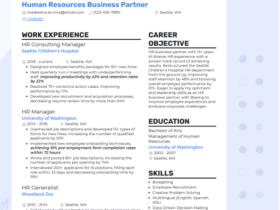Structure of a Good CV for Any Job Application; A well-structured Curriculum Vitae (CV) is your key to catching the eye of potential employers. It’s your professional story, a document that highlights your skills, experiences, and achievements. Here’s a guide on how to structure a good CV for any job application.

1. Personal Details
Start with your name, contact information, and professional title. Include your phone number, email address, and LinkedIn profile if you have one. Avoid including unnecessary personal information like your marital status or age.
2. Professional Summary
This is a brief, impactful statement about your professional background, key skills, and career goals. Tailor this section to the job you’re applying for, highlighting relevant skills and experiences.
3. Work Experience
List your work history in reverse chronological order, starting with your most recent job. For each role, include the job title, company name, dates of employment, and a list of responsibilities and achievements. Use bullet points for clarity and conciseness.
4. Education
Include your educational background, again in reverse chronological order. List the name of the institution, degree obtained, and dates of attendance. If you’re a recent graduate, you can include relevant coursework or projects.
5. Skills
Highlight relevant skills that make you a strong candidate for the job. These can be both hard skills (like proficiency in a foreign language or software) and soft skills (like communication or problem-solving).
6. Certifications and Awards
If you have any certifications, licenses, or awards that are relevant to the job, list them in this section. Include the name of the certification or award, the institution that issued it, and the date you received it.
7. References
While it’s common to note that “references are available upon request,” you may also choose to include professional references in your CV. Be sure to ask for permission before listing someone as a reference.
8. Personal Interests (Optional)
This section is optional but can give potential employers a glimpse into your personality. Include hobbies or interests that are relevant to the job or demonstrate transferable skills.
Remember, a good CV is tailored to the specific job you’re applying for. It should be clear, concise, and free of errors.















Leave a Reply
View Comments